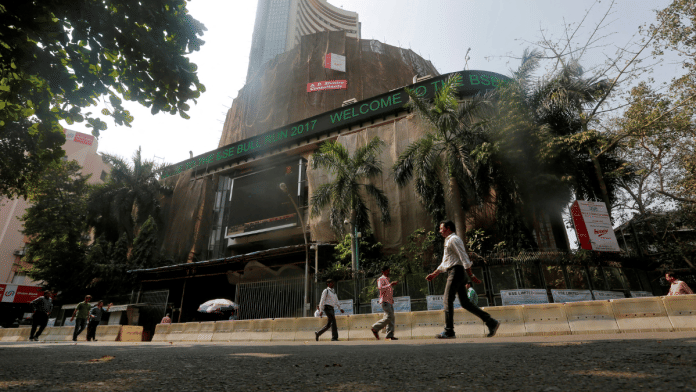New Delhi: The stock market closed flat at the end of the Union Budget day, suggesting that the announcements were viewed neither fully negatively nor positively for the economy at large. While both the indices, Sensex and Nifty, opened positive Saturday, market enthusiasm slipped quickly as Finance Minister Nirmala Sitharaman’s Budget speech progressed.
Sensex opened at 77,637, which was 200 points higher than its previous close Friday. Nifty, similarly, opened 47 points higher at 23,296 from its previous close at 23,249.
Indian equity markets reversed their initial gains and fell into negative territory following the government’s downward revision of its capital expenditure (capex) estimate for the financial year 2025 (FY25) and the announcement of a less than 1 percent increase in the capex amount for FY26.
As of noon, an hour into the speech, the Sensex decreased by 350.20 points, or 0.45 percent, settling at 77,150.37, while the Nifty dropped by 101.15 points, or 0.43 percent, to reach 23,407.25. The market breadth exhibited a mixed performance, with 1,685 stocks advancing and 1,660 declining.
Though Sensex recovered by 0.01 percent at the end of the trading day, Nifty index stayed in the red, ending the day down 0.11 percent.
During her Union Budget 2025 address in the Parliament, the finance minister announced a revised capex figure of Rs 10.18 lakh crore for FY25—lower than the Budget estimate of Rs 11.11 lakh crore. This adjustment negatively impacted investor sentiment, leading to increased selling pressure on major stocks.
Among the gainers in the Nifty index, Trent emerged as the top performer, appreciating by 5.63 percent to Rs 6,077.25. It was followed by Maruti Suzuki, which rose by 4.79 percent to Rs 12,899.8, and Britannia, which increased by 4.22 percent to Rs 5,346.
Additionally, Hindustan Unilever and ITC also recorded gains, rising by 4.05 percent and 3.77 percent, respectively on the Sensex index. Sun Pharma too recorded gains of 0.05 percent following positive announcements for the pharmaceutical sector.
Despite the overall stock market’s muted reaction to the Budget, industry experts and participants viewed the Modi 3.0 budget in a positive light, especially the move to exempt income tax for individuals earning up to Rs 12 lakhs.
Sunil Badala, Head of Tax, KPMG in India said, “Recognising tax as one of the six wheels of transformation towards ‘Viksit Bharat 2047’, this budget highlights the government’s commitment to economic growth.”
“The Budget also focuses on inclusive growth, offering major tax breaks to the middle class, encouraging them to opt for the new tax regime, to senior citizens, startups, and MSMEs, while boosting foreign investments,” Badala added.
The Union government’s decision to exclude 36 essential life-saving drugs from Basic Customs Duty (BCD) and the concessional 5 percent duty on six more medicines were appreciated.
Prabhat Shrivastava, promoter, founder and CEO at VitusCare said the move, “along with duty relief on bulk drugs used for their manufacturing, will reduce the cost of treatment, making advanced healthcare more affordable and accessible to millions.”
“These measures reflect the government’s commitment to patient welfare and its recognition of the financial burden that life-threatening diseases impose on individuals and families.”
Sanjiv Puri, president of the Confederation of Indian Industry, lauded the Union Budget 2025-2026, saying it was “a balanced and growth-oriented plan fostering inclusive development through key reforms”.
He added the National Manufacturing Mission and regulatory reforms will improve the ease of doing business while increased state capex, the National Monetisation Pipeline 2.0, and PPP infrastructure projects will sustain momentum in India’s infrastructure development.
Girish Wagh, executive director of TATA Motors told Reuters, “The removal of basic customs duties on key materials for battery manufacturing is a strategic move to boost domestic EV production, foster a sustainable ecosystem, and drive India’s transition to a greener economy.”
He added that as infrastructure projects gain momentum and consumption picks up, improved roads, connectivity, and logistics will undoubtedly drive increased demand for freight and commercial transport solutions driven by both domestic demand and broader economic recovery.
Saahil Goel, MD and CEO of logistics company Shiprocket, said, “The transformation of India Post’s 1.5 lakh rural post offices, backed by a 2.4 lakh-strong workforce, marks a historic shift in Bharat’s logistics and economic landscape.”
“This initiative will bridge the urban-rural divide, ensuring seamless access to financial, digital, and logistical services in tier 2 and 3 cities. With public-private partnerships and digitization at its core, eCommerce will extend beyond urban centres, empowering local businesses, artisans, and entrepreneurs.”
(Edited by Sanya Mathur)
Also Read: Flat capex, lower subsidies & higher tax revenue. How Budget 2025 hits a fine fiscal balance






